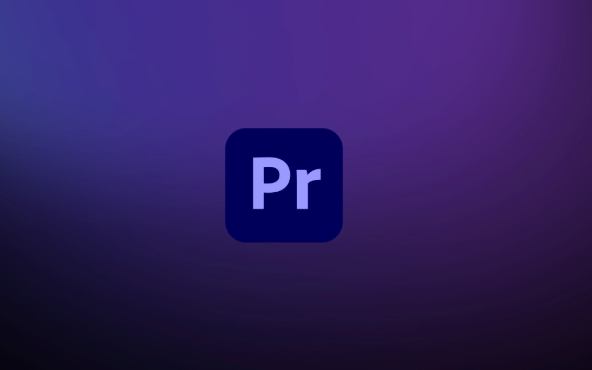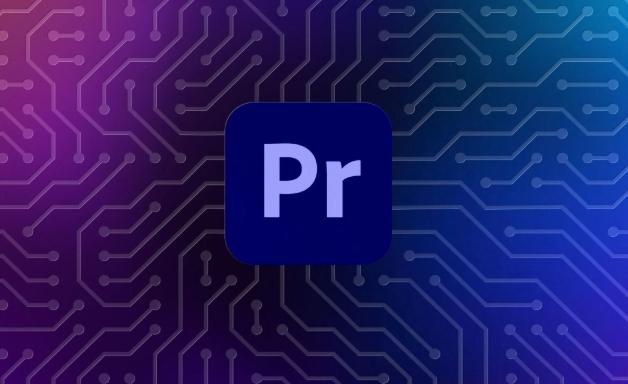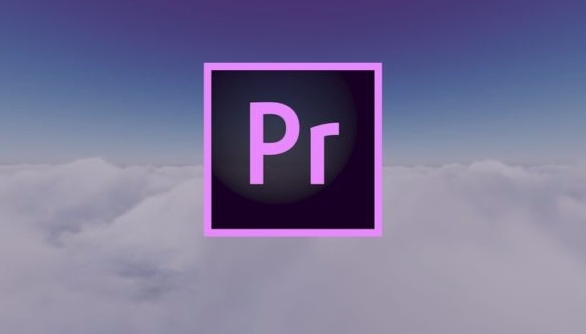how to create a timecode overlay in Premiere Pro
Jul 19, 2025 am 01:23 AMThere are two ways to add a timecode overlay in Premiere Pro: visual timecode and metadata embedding. 1. The visual time code is realized through the "time code" effect, which is suitable for the film review stage, and can adjust the font, position and other styles; 2. When the metadata embedding is displayed, check "Write time code to video" when exporting, which is suitable for delivery and is supported and supports MP4 and MOV formats. Pay attention to the starting time code setting, timeline continuity and software version compatibility issues during operation.

Adding a timecode overlay in Premiere Pro is not complicated, and it can be quickly achieved by mastering a few key steps. You can directly use the built-in function to generate time codes, or you can embed time codes by exporting settings, depending on your usage scenario.

Two common ways to superimpose time codes
Premiere Pro provides two ways to add time codes: one is to superimpose time codes on the video screen in real time , which is convenient for viewing during editing; the other is to embed time codes as metadata into video files , suitable for delivery and review or post-color tuning.

- Screen overlay time code : suitable for film review, feedback and modification stages, you can directly see the time information of each frame.
- Metadata embed time code : It will not be displayed on the screen, but can be read in supported players or software, suitable for use before formal delivery.
If you just want team members to see the time code clearly, the first method is more practical; if it is for archiving or outputting the master, the second method is more suitable.
How to add visual time code to the screen
To add a time code to the video screen, you can use the "Time Code" effect that comes with Premiere. The following are the specific operations:

- Open the sequence you want to add the timecode.
- Right-click in the Project panel → “New Project Project” → select “Time Code”.
- Set the start time code and frame rate (usually consistent with the sequence).
- Drag the newly created timecode anywhere above the video track (recommended to put it in V2 or higher).
- Play the preview and you can see the time code in the lower left corner. You can also double-click it to enter the settings to adjust the font size, position and color.
This method is simple and effective, especially suitable for making samples or build versions. If you need to customize your style, such as changing fonts or adding borders, you can manually make a more personalized overlay using the "Graphics" workspace.
How to include time code information when exporting
If you want the timecode not to appear on the screen, but want to remain in the video file, you can enable timecode writing in the export settings.
When exporting media:
- Select Export Media in Media Exporter
- Click the Settings button next to "Format"
- Check "Write timecode to video" (if format supports it)
Currently, both MP4 and MOV formats support this function, but different players have different levels of support for time codes. QuickTime Player can be displayed directly, while VLC requires plug-ins or specific encodings to be read.
Notes and FAQs
Although the time code looks simple, some details are easily overlooked:
- The starting time code is generally set to 00:00:00:00 or 01:00:00:00, and is selected according to industry habits.
- If multiple fragments are spliced together, ensure that the time codes on the timeline are continuous, otherwise a jump may occur.
- When using proxy clips, the time code may not be displayed correctly and you need to switch back to the original material to confirm.
Also, if you are using an older version of Premiere, some features may be limited, and it is recommended to upgrade to the latest version for better compatibility and feature support.
Basically that's it. Choose the right method according to your needs. The time code superposition is actually very simple, but it is easy to make mistakes due to small details. You will become proficient in trying a few more times.
The above is the detailed content of how to create a timecode overlay in Premiere Pro. For more information, please follow other related articles on the PHP Chinese website!

Hot AI Tools

Undress AI Tool
Undress images for free

Undresser.AI Undress
AI-powered app for creating realistic nude photos

AI Clothes Remover
Online AI tool for removing clothes from photos.

Clothoff.io
AI clothes remover

Video Face Swap
Swap faces in any video effortlessly with our completely free AI face swap tool!

Hot Article

Hot Tools

Notepad++7.3.1
Easy-to-use and free code editor

SublimeText3 Chinese version
Chinese version, very easy to use

Zend Studio 13.0.1
Powerful PHP integrated development environment

Dreamweaver CS6
Visual web development tools

SublimeText3 Mac version
God-level code editing software (SublimeText3)

Hot Topics
 how to fix audio drift in Premiere Pro
Jul 02, 2025 pm 04:01 PM
how to fix audio drift in Premiere Pro
Jul 02, 2025 pm 04:01 PM
To solve the problem of audio and video out of synchronization in PremierePro, first check the timeline settings to ensure that the frame rate matches the audio sample rate; secondly enable hardware acceleration and optimize cache settings to improve performance; then use the synchronization lock function to prevent mismoving the track; finally pay attention to exporting settings, select a stable format and confirm that the audio parameters are correct. Perform the above steps in turn to effectively avoid audio and video drift problems.
 how to make text appear one letter at a time in Premiere Pro
Jul 08, 2025 am 12:02 AM
how to make text appear one letter at a time in Premiere Pro
Jul 08, 2025 am 12:02 AM
To display text letter by letter, use PremierePro’s built-in “Typewriter” animation preset or manually adjust the opacity or zoom of each character. 1. Use presets such as "Typewriter-Reveal" in the "EssentialGraphics" panel to directly apply the verbatim effect; 2. Enable character-by-character animation through the "EssentialGraphics panel" and select Opacity or Scale for customization; 3. Set Start and EndOffset to control the animation rhythm and combine keyframes to achieve dynamic changes; 4. You can adjust the offset, add blur or color change to enhance the effect. It is recommended that each letter lasts 0.1-0.2 seconds and is suitable for phrases rather than long paragraphs.
 how to use the razor tool in Premiere Pro
Jul 02, 2025 pm 03:58 PM
how to use the razor tool in Premiere Pro
Jul 02, 2025 pm 03:58 PM
The method to quickly use the razor tool in PremierePro is to press the C key; 1. Press the C key on the keyboard to switch to the razor tool, or you can find the knife icon in the left toolbar to select it; 2. Position the playback head to the position you need to cut, click the clip to cut; 3. If you need to delete the middle part, you can select the middle section and press Delete to delete it after the same clip is cut again; 4. Use the selection tool (V) to adjust the sequence of the clips or leave a blank timeline; 5. If you need to cut the multi-track clip at the same time, you can check "All tracks" in the top menu; 6. If you accidentally cut the wrong clips, you can undo or right-click the clips; 7. In addition, press and hold the Alt left mouse button to temporarily enable the razor function without switching the tool; pay attention to ensuring that the playback head is used when using it; 6. If you accidentally cut it wrong, you can undo or right-click the clips; 7. In addition, press and hold the left mouse button of the Alt mouse to temporarily enable the razor function without switching the tool;
 how to fix red frames in Premiere Pro
Jul 07, 2025 am 12:16 AM
how to fix red frames in Premiere Pro
Jul 07, 2025 am 12:16 AM
The red box appears in PremierePro because the preview file is not generated or the material path is incorrect. Common reasons include just imported projects, material path changes, insufficient cache space, or failed proxy files loading. Solution: 1. Wait for automatic cache generation; 2. Manually generate preview rendering timeline; 3. Check and relink missing materials; 4. Clean and rebuild media cache. When using proxy clips, you should confirm that the proxy files are correctly associated and appropriately reduce the playback resolution to improve preview fluency.
 how to apply an effect to multiple clips in Premiere Pro
Jul 05, 2025 am 12:22 AM
how to apply an effect to multiple clips in Premiere Pro
Jul 05, 2025 am 12:22 AM
There are three ways to quickly add the same effect to multiple clips in PremierePro: 1. Use the "EffectChainer" tool to first apply the effect to one clip, and then click other clips one by one through the chain icon in the effect panel to apply it in batches; 2. By copying and pasting attributes, right-click the first clip with added effects in the timeline to select copy, then select other clips to right-click to select paste attributes, and only select video or audio effects to paste; 3. Use the adjustment layer to process the video effect, create a new adjustment layer and place it above the target clip, and drag the effect to the adjustment layer to affect all clips below it. The above methods can significantly improve work efficiency and are suitable for the needs of different scenarios.
 how to normalize audio in Premiere Pro
Jul 04, 2025 am 12:16 AM
how to normalize audio in Premiere Pro
Jul 04, 2025 am 12:16 AM
NormalizingaudioinPremiereProadjuststheloudestpeakinacliptoatargetlevel,balancingvolumeacrossclips.1.Right-clickaclipandchoose“AudioGain…”2.Select“NormalizeMaxPeakto”andsetatargetlike-1dBor-3dB.3.ClickOKtoapply;thisscaleseachclip’svolumeuniformly.Itw
 how to fade audio in Premiere Pro
Jul 05, 2025 am 12:50 AM
how to fade audio in Premiere Pro
Jul 05, 2025 am 12:50 AM
Adding a fade effect to audio in PremierePro can be achieved in three ways: 1. Use audio transition effects such as "Constant Gain" or "Exponential Fade" and drag directly to the beginning of the audio clip; 2. Manually add volume keyframes in the "Effect Controls" panel, and control fade speed and nature by adjusting the keyframe position and curve; 3. Use the "Trail Mixer" to drag the volume slider in real time to record the operation track, which is suitable for unified management of multi-track audio. Each method has its own advantages. Newbie can choose to quickly achieve the transition effect, advanced users are suitable for manual adjustment or use the track mixer to obtain more refined control. Finally, it is recommended that preview ensures that the audio transition is natural and smooth.
 how to rotate video in Premiere Pro
Jul 04, 2025 am 01:33 AM
how to rotate video in Premiere Pro
Jul 04, 2025 am 01:33 AM
There are three ways to rotate videos in PremierePro. 1. Use the "Motion" option in the "Effect Control" to accurately adjust the rotation angle, which is suitable for fine operation; 2. Use the "Create Sequence from Clip" function to automatically correct the vertical video direction of the mobile phone, saving time and effort; 3. Use "Crop" and "Zoom" to adjust the screen to fill the screen and avoid black edges to ensure complete output quality.






